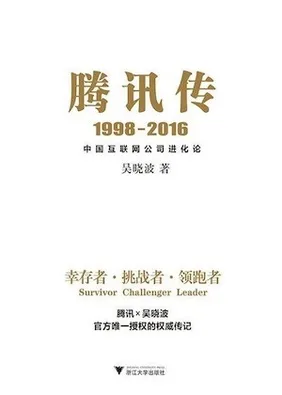I read 腾讯传 by 吴晓波 on Dec 10th, 2018
Tencent has become a predominant player in the Chinese internet industry’s landscape, among Alibaba and Baidu, – which are called BAT.

The book, 腾讯传, aka Tencent’s Legend1, retrospects the history of the company as:
- The company was founded in 1988 to develop a software solution to relay the message from internet to beepers. The beepers was quickly obsolete, so the company pivoted to an ICQ clone, OICQ.
- The OICQ soon went viral, but Tencent did not know how to monetize it. After many attempts to sell the company, they managed to secure the IDG investment before the .COM bubble bursted.
- Partnered with China Mobile, the mobile OICQ rode the wave of SMS SP(Service Provider). Tencent became profitable in June 2001, and went IPO in 2003.
- As China Mobile’ tightened the platform policy in 2004, Tencent diversified its revenue streams with QQ Show(virtual avatar), and QQ mobile.
- In 2005, Tencent declared the strategy: Information, Communication, Entertainment, and Commerce. The service matrix, Qzone(blog service), QQ Music, QQ Pet, and QQ Games touch every aspects of the “online lives”.
- In 2010, the 360 vs. Tencent demonstrated the pinnacle of the conflicts between Tencent and the rest industry.
- WeChat 1.0 was released in 2011, the ticket for Tencent for the mobile app economy. It later evolved as the one-stop solution for your online life.
- Tencent acquired 盛大文学(Cloudary Corporation) in 2013 for publishing and literary IP.
- Tencent acquired Riot, the developer of League of Legends in 2011, and released MOBA in the mobile end, 王者荣耀, aka Arena of Valor with huge success.
- Tencent buys its rivals with the deep pocket since 2015, and becomes the “Softbank of China”.
I agree with the book that Tencent has done many things right in its earlier days.
- Laser focus on the user experience None of ICQ, AIM, Yahoo messenger, MSN messenger was a materialized thread to Tencent’s QQ as the global companies were either ignorant or too arrogant to retrofit its successful product to the Chinese market.
- Fast iteration Tencent took similar development philosophy as Facebook, “move fast and break things”. Thanks to the affordable human resources, Tencent could rollout features much faster than its global rivals. For example, most of the Chinese netizen in 1988 did not own a personal computer, they accessed the internet in the net caffe. Thus, storing the contacts and chat log in the server side would make more sense.
- Minimum Viable Product OICQ is optimized, rewritten to keep it lean in both client side and server side. It made a a difference when download the binaries in a slow network connection. The optimization in the server side helped them to survive before the investment poured in.
- Monetize innovatively Since the user base is heavily skewed towards young demographics, such as students, QQ is never a darling in the ads buyers’ eyes. Tencent pioneered the industry with virtual goods in QQ show and Qzone to monetize on users’ mianzi, aka social status. The rainbow(red, yellow, blue, etc) diamonds were merely declarations of rich than utilities.
I would also like to attribute Tencent’s success to the Chinese economical growth. China embraced the globalization, aka gaige kaifang in 1978, and joined WTO in 2001. The Chinese economy has grown 8% annually for the last 20 years. The urbanization, demographic dividend(人口红利), and the wave of information technology cultivated a massive market for the local players to thrive.
Tencent also benefitted from the lax regulation2, which is downplayed by the book. Tencent had leveraged its platform advantage to cross-promote other services, bundle other applications in its flagship product, etc. It is kind of ironic that Tencent won the AML lawsuit against Qihu 360.
The book also dodged the the intertwined relationship between Tencent and government3. As the most world’s largest standalone mobile app with over 1 billion monthly active users, it would be naive to believe that Tencent can walk out of the government’s radar. On the other side, the approvals of State Administration of Press, Publication, Radio, File and Television, aka 广电总局, have significant impact on the gaming revenues. It would be interesting to see how Tencent influenced the legislation with its power.
Footnotes
-
not an official English name, as the book has not been translated to English yet. ↩
-
The Anti Monopoly Law of China went effect as of 1 August 2008. ↩
-
it is understandable as the book is officially endorsed by Tencent. ↩